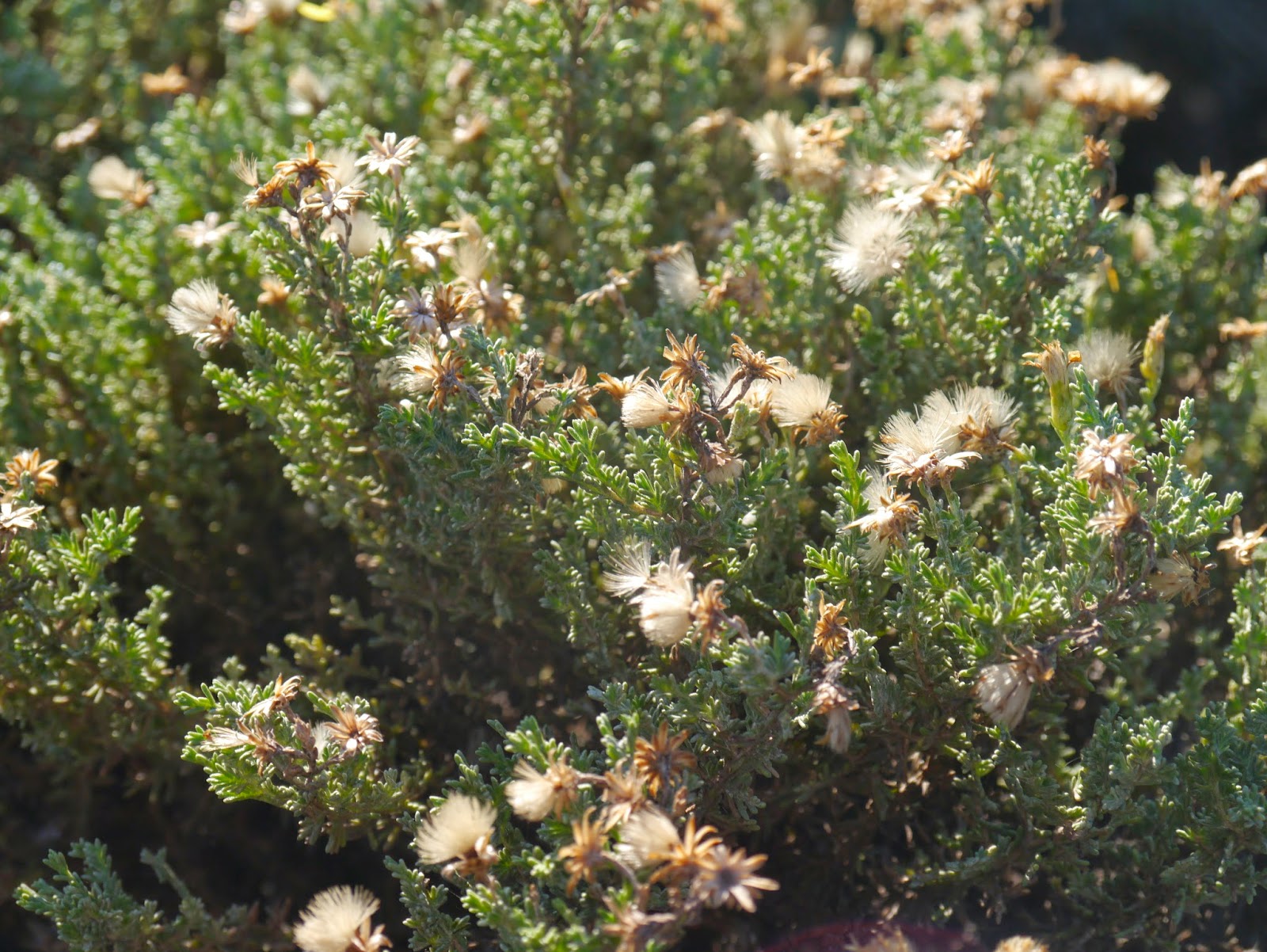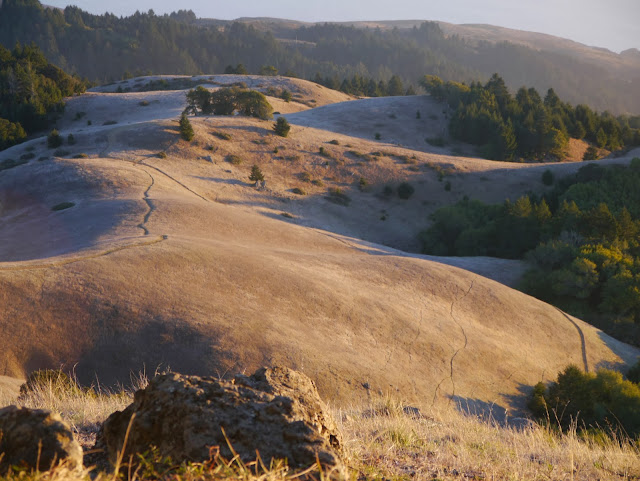I am a child of rain, a child of storm and fog and thunder and the smell of a wet road, a wet garden, and oh my, the wet forest—fir trunk, bay trunk, oak trunk, duff. I remember, growing up, that when the rains came, I would dash out back and run around as the grass got muddy, reveling. I would do rain dances in the side garden with an old friend, invoking our own pantheon of water deities inspired by the Egyptian ones. (Once, it even worked!) When the sky started to get a little patch of blue showing through, I would feel upset— go away, blue, keep raining! Keep raining!
Rain to me has never meant indoor weather, though certainly the book-worm in me delighted (and delights) in the warm evenings by the fireside with my various books (generally, at a young age, chronicling the adventures of various medieval herbalist-animal-speaking warrior-type girls...). It is weather that, for me, demands interaction. It makes me want to throw on my coat and pull up my boots and head straight for the hills. I love the sound of it pattering on the leaves of trees, on the dry grasses as they soak and soak and get ready to turn green again. I love it on the roof at night--few sounds comfort and delight me as much. I love it dripping down my nose and eyelashes out in the hills. It sparks something in me, some kind of fire that sends me dashing and whirling and leaping, perhaps like the roots underground in this drought-prone place, who must surely go into throes of ecstasy when that first big storm comes, who must positively sing as they drink, and drink, like my own soul does.
But this year, as you well know by now I am sure from all the News, no storm has come.
 |
| The dry hills of Pfeiffer Ridge in Big Sur. Just south of this photo, a whole ridge was burned in a bad wildfire in late December. A winter wildfire is never a good sign. |
 |
| Oh beauty, Oh Big Sur |
I know that deep drought has touched California before (though not this deep since around the 1500's, according to geologists and those folk who study historical weather patterns and climate). I know that the seeds of the wildflowers in the ground are not dead, just dormant, even as the hills turn a darker and grayer dry brown than I have ever seen, a ravaged color. I know that heat can cleanse, like a fever. I know that an oak tree has deep tap roots that touch the dark cold waters of the ground.
But my animal body mourns the dry. My animal body craves the change of a season—and for you eastern folk, yes, California does have seasons, indeed, and they have to do with rain, and the blooming of different flowers, and fog, and the migrating of whales and of birds, and so many other things. My animal body has dreamt of running through rainstorms, only to wake and smell the air out the window and know that the sidewalks are dry. My animal body feels grief, it feels great unease that seems to leak into my all-too-human-mind, making anxiety rise more often, unbidden, like wildfire, able to catch light anywhere.
The plants are frozen in time, dry husks. They are wise, though. These chaparral and coastal scrub plants of Big Sur (and the rest of California), like the black sage below, know about droughts in their seeds, in their genetics, in their resinous hearts. They know how to keep water from transpiring off their leaves. They know how to go dormant into the dry times. They smell sweet, and strong, despite everything.
A part of me wants to run north, run toward the rain—some kind of wild and nomadic instinct, to follow the water, to run from drought. And without a doubt nomadic peoples of the past and present did and do just that. I've said to friends, laughing—I may need to take a train to Oregon and go lay down in a rainstorm, to be renewed, partly joking, partly serious. But another part of me, the part that is full of a grief beyond just the "soft animal of my body," as Mary Oliver would say, the part that feels, somewhere sick and sorrowful in my stomach, that this is our fault— that part of me knows that we have to stay with this. We have to stick with it, like the black sage, like the coyote brush, who cannot leave.
I think that it is only through our emotional bodies that we can really access the great environmental griefs of this era we are living through. And our emotional bodies are activated, at least in my experience, by those things which occur right around us, on the land we love, in the air we love, amidst the people and plants and trees and streets we love. Global warming and climate change have been horrifying, sad, frightening but somehow impersonal concepts to me until now. Until this dryness, this drought, which may, it's true, be "just another climate cycle," but really, honestly, let's just be straight with each other here—we've had a hand in this, we know we have. The really bad ramifications of a prolonged drought here— agricultural shortages, massive wildfires, eventual clean water scarcity—have yet to even set in, though I know that our local, small scale farmers are already panicking, and tapping into their ground water, and they, more than anyone, deserve their rain-prayers answered. I dearly hope we can avoid the worst of this. But even now, as I feel the scratchy dry air in my throat, it makes me want to yell. I can feel my rain-loving soul thrashing around, as I search the sky in the morning for clouds.
It has been believed through the ages that a drought was a sign that humankind had offended the deities of earth and sky. Whatever the "true" cause of this one, I think we might benefit from a healthy dose of this sort of humility, this kind of morality, remembering that our actions really do affect the great web of life, from ants to rainclouds, that we have a responsibility to this earth which nurtures us every day—the air we breathe, the water we drink, the food we eat, the blood in our bodies. At this point, of course, I'm not sure a rain dance and offerings of sorrow left out on every roof would do the job. I think we're in a bit too deep. I'm not sure we deserve a mythic solar-hero to go and fight the dragon out over the Pacific who holds the rains in his stomach, and yet I so, so desperately wish he would come along. I think it is a lesson—that we have overreached, here in California, much of which is as arid as parts of Morocco. That we have built up our civilization in a period of record wet, and while this drought is very likely much exacerbated by global warming, it is also part of California's character to go dry for periods of time.
Despite this calm rationality, I am writing these words because really, I am sad, because I am scared, because I am a lover of rain, because, like a good soft animal, I do not want these cycles of dryness to change the land I love, even though I know the land I love has many faces, and many phases, and part of learning to be fully human is to learn to ride through change, and adapt to it. I am writing this because I do not think we are given the space in this culture to grieve the changes we have wrought upon our landscapes, our air, our clouds, to express the anger and fear and helplessness that we often feel, or repress. After all, when we call most non-human beings "Resources" instead of "Kin," not much room is left for emotions such as sadness, such as loss and sorrow. You cannot mourn a resource. That's why I like the language used in many Native American cultures, such as the Yurok, who called all beings "people"— frog people, cloud people, human people. You can mourn the cloud people, after all, the rain people, the thirsty deer people, the newt people who have had no winter rains to spur on their mating season, the salmon people who can't make it upstream.

At the same time, as naturalist and herbalist Jolie pointed out to me this weekend, it's good to remember that while we may grieve, the plants do know about drought, like this Big Sur succulent above, which has dry and water-conservation and heat written all over it. And the native bunchgrasses may make a come-back this year, she said, pointing to the only tufts of green coming up under the dry grey-gold, which were, indeed, growing in those classic perennial bunches. At long last, perhaps they will have a chance to outgrow the invasive grasses.
In our own tangled and wild garden, the daffodils are already up, and the bees are busy gathering their pollen, and it is hard not to smile at a bee in a daffodil, with pollen on her legs, and the smell of that daffodil up to your nose. It is hard not to smile at the smell of the apple blossoms, so early, the magnolias on the street, the bright yellow faces of the sourgrass exploding everywhere along sidewalk edges.
It is hard not to smile at the sunny calendula, which hasn't missed a beat since we moved in at the start of November. And as my small 6-year old neighbor told me out in the garden as we searched the dirt for worms—if you spray the yellow flowers, and the lemons maybe too, with a little water at dusk, the fairies will come and collect the gold. Well, I thought, well. I do not know what our summer is going to look like, or even our spring, but now the flowers are coming out gold, today, this moment, and so there is always beauty, every day, everywhere. And so we adapt our hearts and our spirits, just a little bit, just enough, because that, also, is what animals do, in order to survive, in order to stave off sorrow. At once, we do not forget to sing out to the clouds, tell them how much we love their wetness when it is poured up us, how much we love the smell of mud, the sound of rain on our roofs, the taste of it on our tongues. Whether or not it coaxes thunderstorms, perhaps such songs, such prayers, will douse our hearts with a little fairy-gold, will fill our own souls with enough rain to carry on, to make small changes, to look a warming world in the eye, to look our own guilt in the eye, and some make good of what we do, that it may be somehow in service to the land which holds us, even if that service is just a word of praise, said aloud, to a raincloud.
P.S. Nevertheless, Sir High Pressure Ridge out there beyond the clouds, if you are ready, and only in your own good time, perhaps it is time to let go. Perhaps you, too, would enjoy a big thunderous rainstorm come washing, at long last, through your high-pressure spine.









































